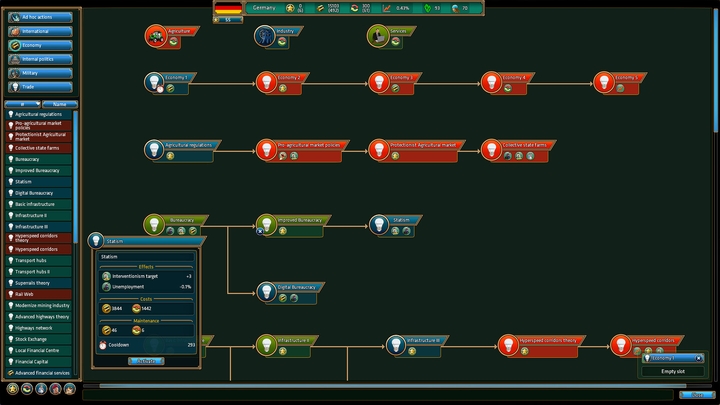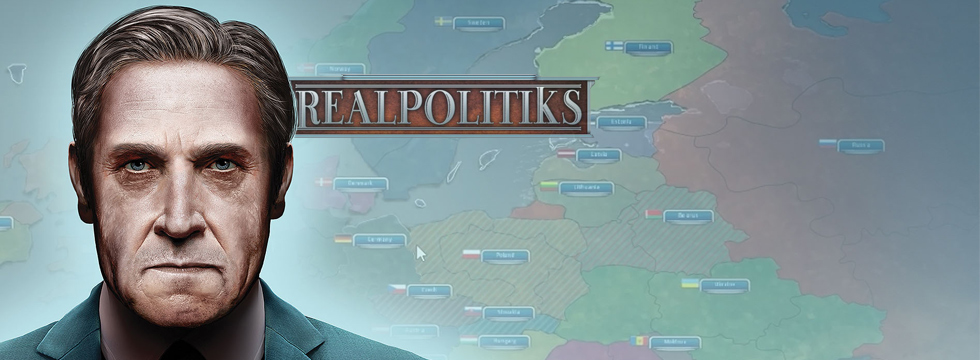Realpolitiks Hands-on – a little grand strategy game inspired by games from Paradox
Realpolitiks is a rather plain strategy game, borrowing some concepts from the Swedes at Paradox. What sets it apart is the modern setting and simplified, more user-friendly mechanics.
This article was written prior to the game's release.
This text was based on the PC version.
- Global-scale strategy game;
- Inspired by the works from the Swedish studio Paradox, only less complicated;
- Extensive management mechanisms;
- Action begins in the present and continues throughout the 21st century;
- Hot political issues (war in Ukraine, migrant crisis);
- Additional political fiction scenarios (e.g. the collapse of the US);
- A single campaign requires a few hours to complete;
- Single player only;
- Slated for release in autumn this year;
- Predicted price: around 15 Euro.
May you live in interesting times – this old curse (because interesting equals dangerous, obviously) returns today with multiplied force. Contrary to the hopes of the optimists, the end of the Cold War wasn't followed by the infamous "end of history". The events of the last two years – the wars in Ukraine and in Syria, the European migration crisis, the terrorist attacks – have shown how illusory was the belief in a peaceful coexistence.
Still, the challenges the world is facing today turn out to be a great premise for a strategy game. Polish developer Jujubee is currently working on Realpolitiks, a title inspired by the popular productions from the Swedish studio Paradox, as well as the classics of... political science, like Samuel Huntington, the author of the famous book Clash of Civilizations. Looks like a very promising production is coming for all the fans of strategy and geopolitics. This autumn, the creators of Realpolitiks will allow us to lead one of the modern nations over the following decades of the 21st century.

Realpolitiks, a game covering the whole globe, is being developed by a small team operating within the studio Jujubee. The Katowice-based company is known for creating, among other things, mobile games (the Flashout series), but their best known project is Kursk. Kursk will be an adventure game for PCs and consoles, the plot of which revolves around the sinking of the Russian nuclear submarine K-141 Kursk in 2000. The authors call their work the first documentary video game, although it is difficult to see their choice of topic as something more than an attempt to gain spotlight by using a controversial subject.
A geopolitical gambit
It takes no more than a single glance to notice what inspired the Polish developers. Their game bears a strong resemblance to the works of the Swedish studio Paradox – namely Europa Universalis and Victoria, both series well known to any fan of historical strategies. Thus, we have a large world map with a clear division into provinces, real-time gameplay (with the option of changing the speed), resource management, and significant role of random events. In contrast to the Swedish games, the Polish strategy is set not in historical times, but today and goes on through the subsequent decades of the twenty-first century. But let's begin with the basics.
In Realpolitiks we take on the role of a leader of one of the countries. And we're talking real countries, the ones that can be found on any modern map. The political fiction scenarios are the only exception, because that's when the map suddenly sprouts many new, fictional nations. The creators of Realpolitiks suggest choosing a country of at least medium size to begin with, because playing as a small state such as Estonia simply limits the player's options and doesn't provide full satisfaction.
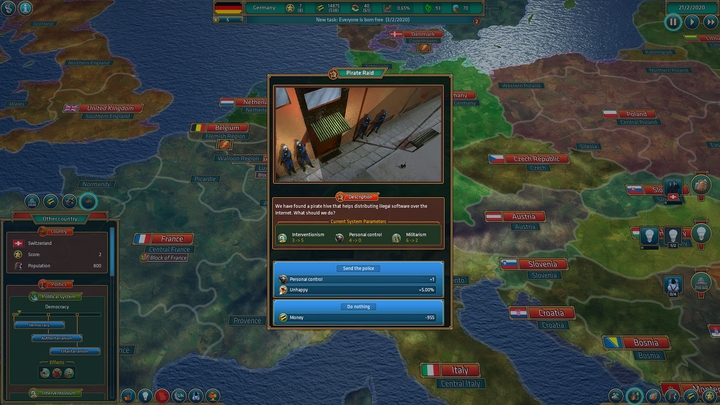
As you might have already imagined, during the few hours of fun in a single campaign we get to decide the fate of a state. In this regard, Realpolitiks is pleasantly surprising, as each country is characterized by numerous parameters. Depending on our decisions concerning random events, as well as the laws we enact, we will guide it along the path of democracy, authoritarianism or totalitarianism. Each of the regimes affects our available options (in totalitarianism we will be able to e.g. kill political dissident, and in democracy we will need a really good reason to start a war), economic growth, and relations with our neighbors.
It's hard to judge so early on exactly how extensive the mechanics of state management will be, but this short presentation has made quite a positive impression on me. The creators tended to the in-game balance by introducing the country's aggression index – the higher it is, the more aggressive and prone to attacking the AI becomes. The game will also include scientific research, allowing us to produce and earn more, and our soldiers to be armed with more and more advanced equipment (as some parts of the game take place in the future, we will be able to research e.g. laser weaponry). I also appreciate that the creators promise an extensive system of random events, game mechanics highly-valued in the games from Paradox – some of them will be associated with a particular country, some other with a particular regime, and yet other will be common to all states. The game will feature all kinds of challenges of the future which are now discussed mostly in the context of possible developments, such as rising global water levels, competition for access to drinking water, or the great conflict between USA and China.
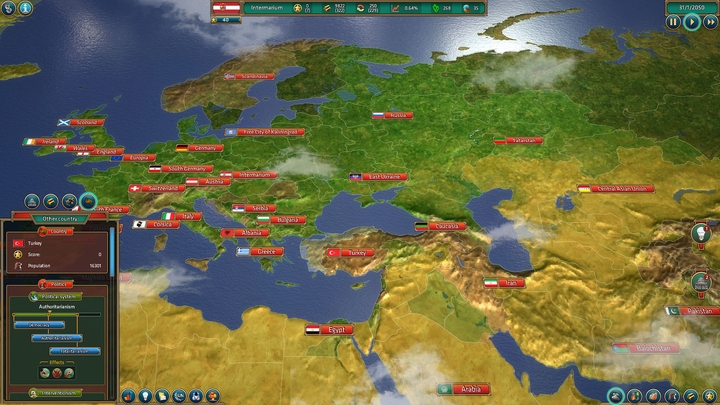
A clash of civilizations
Setting the game in modern reality poses a number of challenges for the creators, all of which are absent from productions set in the past. Let's start with political issues – when designing the game world, the developers at Jujubee based, among others, on the concepts of a well-known American political scientist, Samuel Huntington. The author of Clash of Civilizations predicted an increase in global political tensions and a recurrence of competition between the cultures. We will refrain from speculation on the correctness of his theses in this article. It needs to be noted, however, that they fit really well into the premise of a global strategy game such as Realpolitiks. Modern times are also the context of current political events – the creators tackle the topic head-on, including, among others, the War in Eastern Ukraine (on the main world map Crimea and Donbas are already within the boundaries of the Russian Federation) or the European migrant crisis.
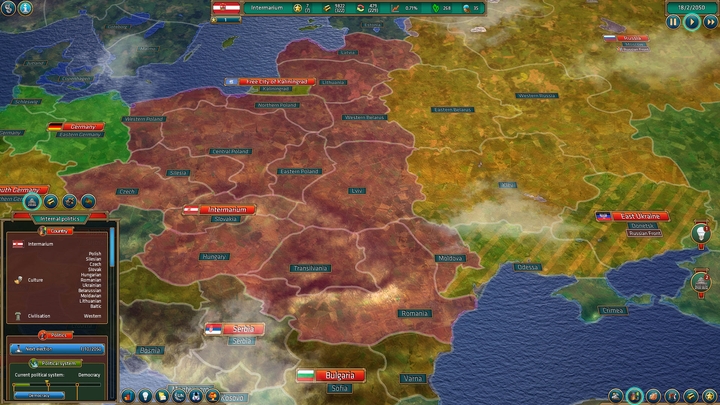
An interesting option provided by Realpolitiks it the possibility to play out semi-fictional scenarios, introducing significant changes in the balance of global political forces. The creators themselves admit that apart from referencing actual trends (e.g. Internal conflicts within the Russian Federation or separatist movements in Europe), they were aiming for... balance. As a result, the existence of some of the new states does have a reasonable justification while some other does not (e.g. the US dividing into several countries is something I cannot imagine), but in exchange the additional scenarios feature more medium-sized countries, and less empires – which makes the game overall more balanced.
The Polish Intermarium
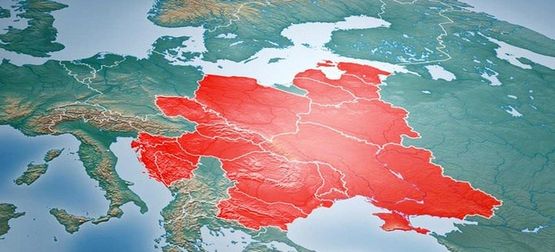
Intermarium, which means "Intersea" or "Between-seas", is an old Polish geopolitical idea proposing a federation of Central and Eastern European countries stretching from the Baltic Sea to the Black Sea. Its most famous proponent was Jozef Pilsudski.
As part of one of the fictional, post-World War III scenarios in Realpolitiks we can play as a leader of the Polish Intersea. This alternative vision of the future adopts several other changes on the political map of Europe – for example, southern France becomes an independent Muslim state, while Scotland or Catalonia gain independence. The scenario also assumes the collapse of China and the United States.
Grand politics in a modest envelope
Realpolitiks was developed by a small team, which is reflected in its simplified character. We can see it, for example, in the way the wars are conducted: we do not move our armies around the map – our participation is limited to recruiting and improving them, and then sending them to the front with a few clicks. After we declare a war, a new window opens, displaying the details of the theater of war, where the clash between the countries concerned is resolved automatically. Depending on available manpower and level of technology one of them eventually wins. The creators approached the simplifications systematically, trying to turn them into an asset to their production – their objective being to reach the recipient that doesn't have the time for overly complex strategies such as Stellaris or Victoria. In fact, the games by Paradox are known for their high entry threshold, so naturally, besides thousands of fans they have also spawned critics and people simply discouraged by the difficulty level. Will Realpolitiks be able to win those players over? We’ll find out this autumn. There are more and more games being created aiming to offer the players elaborate simplicity – no doubt the developers must have recognized the fact that the age of the average consumer is steadily growing, and hence, that those people no longer have as much time for their hobby as they used to.
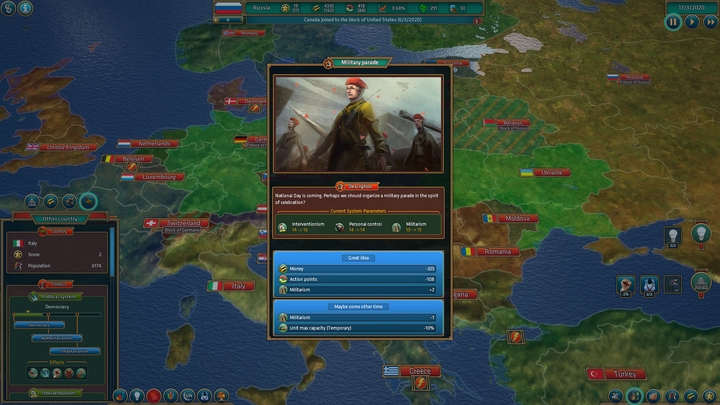
Realpolitiks has one more striking trait – plain visuals. The world map is hardly impressive, it lacks elements that would provide at least some variety (e.g. buildings, forests or military units). The only thing that is distinctive are the borders between provinces and the colors of individual countries. The same goes for the anything but eye-catching interface windows. I sincerly hope that the developers decide to add some zing to the game's visuals, because – and it's an indisputable fact – a flimsy packaging can discourage from playing with even the best mechanics.
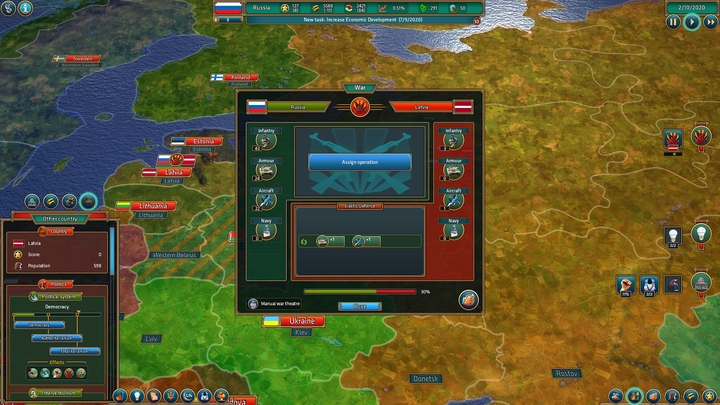
First time I learned something more about Realpolitiks was during the Digital Dragons conference in Krakow. Initially I approached the subject with a big dose of skepticism – back then I thought it to be a modest introduction to a dull game. I was wrong, however – the production from Katowice-base studio Jujubee looks very interesting. Of course, it is aimed at a specific group of players, but it offers them something rare in video games – the opportunity to play a complex strategy game set in modern times. In this regard, Realpolitiks is similar to Democracy 3, and I hope that it will be equally successful.
